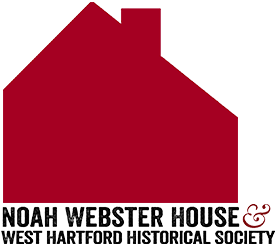Life on the Webster Farm: Work Days
Join us for Life on the Webster Farm: Work Days – January 13, February 10, March 9, April 13, May 11, June 8, July 20, August 10, September 21, October 12, & November 30!
Visit the museum on select Saturdays from 1:30 p.m. – 3:30 p.m. and enjoy live demonstrations from our experienced team of museum educators. Each demonstration will focus on a unique aspect of early American work and play. Stop by and learn about the trades and activities of life on the Webster farm!
This program is included in museum admission. Enjoy FREE general admission for children under 12 for this event!
See below for specific program offerings! For more information, please email events@noahwebsterhouse.org.
Thank you to our 2023-2024 Sponsor, the Rotary Club of West Hartford!
January 13, 2024 – From Sheep to Yarn
Where does yarn come from? What is it used for? Our museum teachers (in 18th-century period attire) will demonstrate how to spin sheep’s wool into yarn on our reproduction spinning wheels. Want to learn how? Try your hand at “carding” the wool, or finger-spinning and using the drop-spindle. Take home a sample of the wool …you’ve earned it!
February 10, 2024 – From Milk… To Butter & Cheese
Milk still comes from cows, but transforming it into butter or cheese is a little easier in the 21st century. Our museum teachers will demonstrate how to churn butter by hand… and demonstrate how cheese was made on the Webster Farm in the 18th-century. If you’d like to pitch in, we are happy to show you how! Dairy samples will be available for tasting.
March 9, 2024 – Dancing the Time Away in Early America
Dancing was a favorite pastime of early Americans, including Noah Webster. Men, women, and children found relief from work by taking part in dancing. It was a time to “kick up your heels” and enjoy time with family and friends. Join us at the Noah Webster House and learn how to dance the Townsend Reel and a favorite among children, Allee-Allee-O.
April 13, 2024 – Early American Games & Toys
While early Americans in New England worked hard to fulfill household and farming responsibilities, they also found some time to have fun! Museum teachers will show your family how to play centuries-old games like “Jack Straws” and you can try your hand at early-American toys like the “ball & cup” (still fun today!), the Jacob’s ladder, a hand top, or a “button buzzer”. Make your own “button buzzer” to take home with you!
May 11, 2024 – From Sheep to Yarn
Where does yarn come from? What is it used for? Our museum teachers (in 18th-century period attire) will demonstrate how to spin sheep’s wool into yarn on our reproduction spinning wheels. Want to learn how? Try your hand at “carding” the wool, or finger-spinning and using the drop-spindle. Take home a sample of the wool …you’ve earned it!
June 8, 2024 – From the Garden: How Early Americans & Indigenous People Benefitted From New England Herb Varieties
Our museum teachers will lead you through a tour** of Webster’s east garden to explore how herbs were used for flavoring food, making medicine, fragrances and insecticides. Create a lavender sachet to take home with you… a relaxing and natural air freshener.
July 20 – From Yarn to Cloth
Join us for a first-ever demonstration of our barn loom since its recent repair! Learn about the process of weaving and try your hand at different kinds of weaving during your visit!
August 10 – The One Room Schoolhouse
Come and experience what school was like for Noah Webster and his classmates in the 1770s. Visitors will write with quill & ink, use slates to practice lessons, and read from Noah’s famous “Blue Back Speller” and horn books! Also, find out what games students would play at recess… come and find out!
September 21 – All About Apples!
For many, fall in New England is characterized by apples. Learn about the importance of apples for early American families. Guests will help create apple recipes, crafts, and learn about the process of food preservation.
October 12 – Decorative Textiles at the Noah Webster House
Most of the making of textiles was done out of necessity to clothing and household goods. However, decorative needlework, knitting, crocheting, and weaving was an early American art form. Come see examples of textiles from our museum collection and use the same materials to make your own creation!
November 30 – Hearth Cooking
Try your hand at cooking meals over the open flame in our 18th-century reproduction fireplace! Our museum teachers will discuss how the Webster family prepared meals, where the ingredients came from… and tools that were used in cooking and baking.


